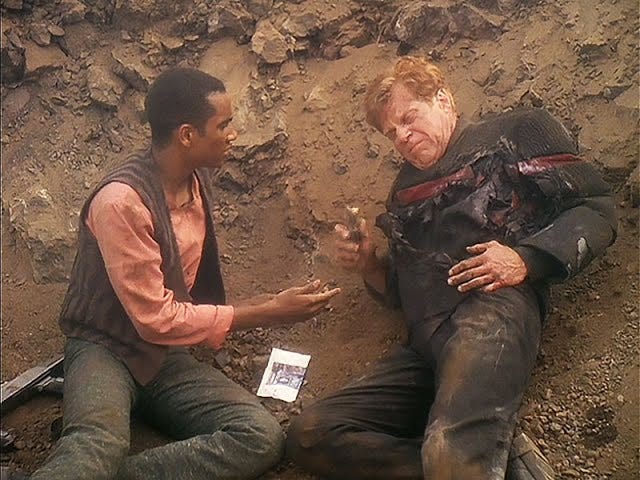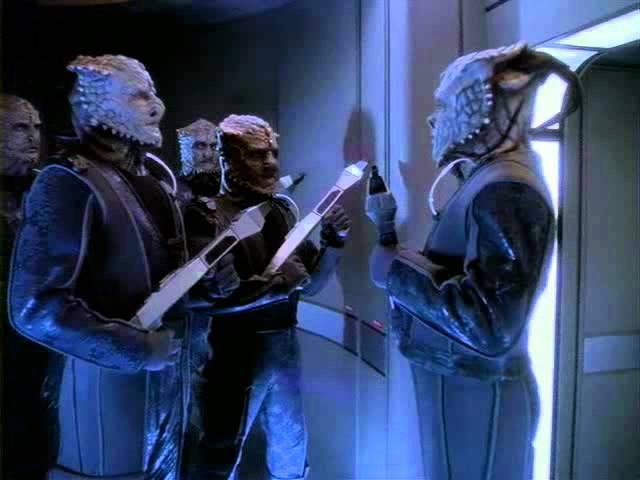Is DS9 Anti-War?
"War is hell" isn't really a plea for peace.
Taking a break from the star trek TOS rewatch while on vacation, but thought I’d share this piece on DS9 instead. We’ll be back to regularly scheduled posting next week!
______
Star Trek in most of its iterations presents a utopian future in which a more enlightened humanity has moved beyond discrimination, hatred and violence. Deep Space Nine was an exception. It imagined, at least sporadically, a grimmer, darker tomorrow, and a grimmer darker Federation, where humans were still struggling with those old familiar bugaboos of greed, political self-interest, and armed conflict.
Especially that last one. Much of DS9’s seven season run from 1993 to 1999 involved an extended war with a shape-shifting species known as the Dominion. Episodes, like “The Siege of AR-558,” and “Nor the Battle to the Strong” feel more like World War II movies than Star Trek episodes with their themes of personal courage, grim determination, and the horror of death. War, the series tells us, is hell.
Brutal, Ugly, and Necessary
Like many of those old movies, though, DS9 also illustrates that hating war is not exactly the same as opposing war. DS9 sees violence as brutal, ugly, and necessary—and the necessity carries with it a kind of gritty glamour. Those other Star Trek shows are fooling themselves in thinking humans have evolved beyond the need to seize freedom and honor with your teeth. The very misery of war is a kind of justification.
Both the episodes mentioned above focus on young men—Jake Sisko (Cirroc Lofton) and Nog (Aron Eisenberg)—confronting battle for the first time and struggling with their own relationship to fear and honor. They’re coming of age stories, in which battle is an initiation into the hard truths of manliness. War, the series tells us, is truth.
Part of the truth of war in DS9 is that sometimes you have no choice but violence. The Dominion is an implacable foe, with advanced technology and characteristics of both of those American arch-enemies of the 20th century, the Nazis and the Soviets.
The Founders who exercise absolute rule over the Dominion are a collective hive mind of shapeshifters who infiltrate Federation command structures, in the mode of paranoid Cold War narratives like The Invasion of the Body Snatchers. But, like the Nazis, they’re also explicitly racist eugenicist proponents of genocide.
The Founders have utter contempt for non-shape-shifting solids. They believe they have the absolute right to rule over solids and/or exterminate them. Their minions, the Jem'Hadar are genetically grown to be (apparently all male) perfect warriors who live solely to fight and kill. They lack even a Klingon commitment to honor in battle. In “The Abandoned” the DS9 crew find a Jem’Hadar child, and try to raise him in line with Federation ethics of peace and tolerance. He remains violently uncontrollable, underlining that war with the Dominion is a biological inevitability.
Whose Invasion? Whose Genocide?
There is a bit of sleight-of-hand here though. While the Dominion is an aggressively expansionist and colonialist empire, the Founders aren’t the ones who do the initial invading. Instead, it’s the Federation which insists on entering Dominion territory. DS9 is positioned near a space wormhole, and the Federation encounters the Founders on the other side.
The Dominion makes it extremely clear that it doesn’t want the Federation in its territory. But the Federation won’t stop what it insists are peaceful missions of exploration and trade. The entire war could have easily been avoided by just shutting or destroying the wormhole. This would have been economically and politically costly. But not as costly as the Dominion War turns out to be.
Yet, no one in the show ever really questions the Federation’s own commitment to soft imperialism, or its decision to keep pushing into Dominion space when it was told repeatedly to stop. War is a hard, unavoidable truth in part because the Federation has its own expansionist aims, which are non-negotiable in the comprehensive sense that they are never negotiated within the show.
DS9, then, puts its thumb on the cosmic scale when it insists that war is necessary. That other side over there is presented as innately, unswervingly, unstoppably evil; the fact that our side started the conflict is carefully tip-toed around. Little wonder that the Federation eventually finds itself embracing bio-genocide itself, by infecting the Founders with a deadly disease which will wipe them all out. The morality of this measure is intensely debated, mostly because the disease will also kill good-guy founder Odo (Rene Auberjonois). But success is its own justification, and the threat of certain extinction is the one thing that is able to convince the Founders to lay down their weapons and cede the war to the Federation.
The series does show the inadequacy of Star Trek’s utopian ethic of nonviolence and noninterference—though not perhaps quite in the way it intends. DS9’s explicit message is that beneficence and kindness and space social-workers are all very well up to a point, but sometimes you have to get your hands bloody to protect what you love.
We Come in Peace, Sort Of
If you are willing to be a bit more skeptical of the Federation’s motives, though, you might conclude that the problem is not that the Federation is too nice, but that it’s too nice to itself. Star Trek was confident in its own righteousness—but when DS9 challenged that righteousness even a little, the series moved swiftly to justifying genocide with only a brief pause to furrow an occasional brow.
Avoiding avoidable wars requires more than saying, “We are peaceful!” It requires a rigorous willingness to question one’s own motivations and justifications, and a willingness to make real material sacrifices for peace. Even twenty years later, a mainstream science-fiction property that followed up on those insights, Star Trek or otherwise, would truly be boldly going where few shows have gone before.
____
I wrote this piece a bit back, and am reading it now, inevitably, in light of Ukraine. I think it’s important, among other things, that the Federation escalates the conflict over and over in a way that the US and Ukraine are mostly trying to avoid. Federation incursions through the wormhole are also a more of a direct aggressive act (imo) than anything the US did in Ukraine (contra the conspiratorial anti-NATO mutterings.)
Resisting fascism is important; advocating total pacifism in the face of encroaching imperialism isn’t generally a great idea. Still, I think it’s easy for pop culture, given war film tropes, to advocate for cleansing violence—up to and including genocide. It’s worth being skeptical of that.




